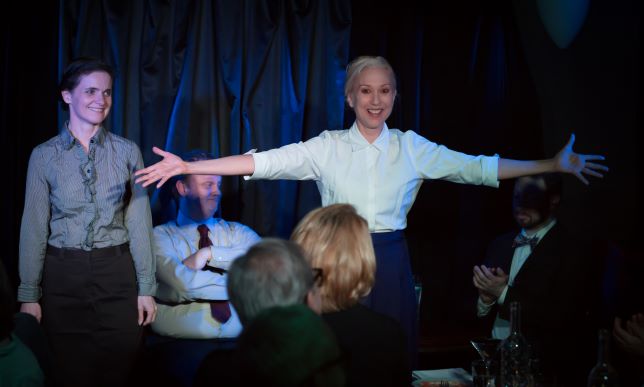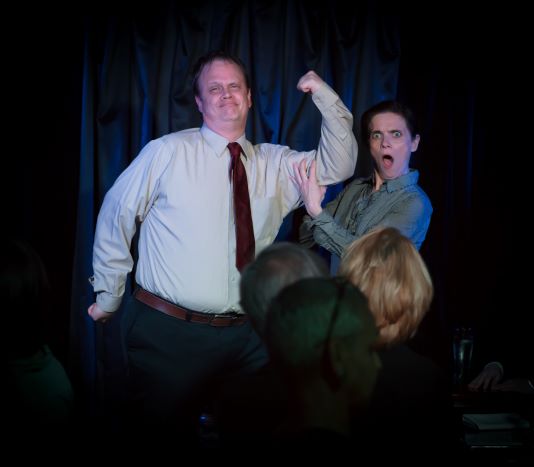We recently got to chat with Edward Einhorn about the upcoming performances of Cabaret in Captivity. An annual cabaret produced by Untitled Theater Company No. 61 in honor of Holocaust Remembrance Day, Cabaret in Captivity will have performances as part of New York City’s Open Culture program.

Photo credit: Arthur Cornelius
Edward shared his thoughts on the pandemic affecting the Broadway and theater communities, the inspiration behind Cabaret in Captivity, and upcoming projects his audience can look forward to.
Read on for our exclusive interview with Edward Einhorn below:
I truly feel this past year has hit the theater communities the hardest. It’s a testament to the strength and heart of everyone involved to say and prove “We won’t go down without a fight.” How would you say this past year has affected you and your work and what are your hopes moving forward?
The pandemic came just as we were about to move our first production to London, for an Off-West End production (The Marriage of Alice B. Toklas by Gertrude Stein). That was quite devastating, as it was years in the making, but we are optimistic that it will finally happen in this coming season. Meanwhile, we have made do: we have a one-on-one piece, Performance for One, that we have been producing via Skype since March 19 of last year, and it’s still going strong.
We made one audio drama podcast, The Resistible Rise of J. R. Brinkley, and we intend to have another, The Iron Heel, being released May 1. We even made our own virtual theater simulation game, Poor Players, to be played via Zoom. And now we are heading into outdoor theater. We hope to also present a new piece outdoors by the end of the summer, which is in development right now. It is called Locust.
Tell us a little about Cabaret in Captivity and how that came to be. What was the inspiration behind its inception?
Lisa Peschel, a scholar working on a book about Terezin, approached me because I have done a lot of work in collaboration with the Czechs and also Jewish themed work. She had discovered a treasure trove of work created during the Holocaust, at small cabarets the inmates would have for each other. Terezin was a unique camp: it was full of artists, and it was a show camp for the Red Cross, so such things were allowed. Most of the inmates, sadly, were eventually shipped to extermination camps. But the work they created was inspiring, and after I created a small presentation for her, I decided to make it a full yearly cabaret.
It has been eight years, and versions of the cabaret have been presented at the York Theatre, the Czech Center, the Center for Jewish History, and Pangea in New York, as well as the Czech Embassy in Washington DC and with Goodenough College in London. This is our first outdoor production, and once again we have altered it to fit the environment (and our limited ability to rehearse together).

Photo credit: Arthur Cornelius
Given the subject matter and how it’s still so important even now, can you talk a little about why this was so meaningful for you to share with your audience?
I truly believe that art and live performance is a necessity, and there are few greater examples of that than these inmates, who despite their terrible circumstances found ways to share joy with each other through performance. I and many have been feeling the lack of that connection through performance over the last year. Though our artists have hardly had to survive a camp, I think we all need something to feed our souls at the moment. And always, the Holocaust needs continued testimony: as survivors die, something needs to keep their memory alive, and what better than their own words and music.
You are also listed as co-directing the production alongside Jenny Lee Mitchell. What do you enjoy most about directing when compared with your other works?
To me, directing is about conveying the things I love about a work to an audience. It is a form of communication, first with the performers, then the audience. I have missed that communication over the last year, of course we have had substitutes, but nothing compares with the opportunity to be in a shared space.
With live performances being so incredibly limited due to the pandemic, how exciting is it for you and the cast to essentially get back out there and share and perform? What are you most excited for the audience to see and experience?
I have dreams about performance, all the time. We are all extremely excited to be back with an audience. And what I miss most is the sounds of laughter and the ability to look and see the eyes of the people watching. You learn so much from having a live audience, it teaches you what works and what doesn’t, and it alters the performance. Doing a play on Zoom, with no audience presence, feels like you are missing one of the star performers.
I know the weather has changed your plans a bit. Can you share any updates or changes you’d like the readers to know about the upcoming performances?
April 18 at 5pm looks promising, so we are very hopeful about this Sunday. And we have applied for a Sunday May 16 date — waiting to hear from the city about that definitively.
More information about Cabaret in Captivity:
Sunday April 11 and April 18, at 5pm$25 Ticket (suggested donation)Buy tickets from www.untitledtheater.comCabaret in Captivity, an annual cabaret produced by Untitled Theater Company No. 61 in honor of Holocaust Remembrance Day, will have two LIVE performances on April 11 and 18. The program includes songs and sketches written in Terezin/Theresienstad. Terezin was located an hour away from Prague, and during World War II it served as both an internment camp and a way station for the concentration camps during the Holocaust. Full of satire, bitter humor, and hope, these pieces demonstrate how art became a vital survival technique for the inmates. Most of these pieces were recently recovered through the efforts of scholar Lisa Peschel, who also translated the majority of the work.This is part of New York City’s Open Culture program. All audience members are asked to bring their own seating, as the seats available will be limited. All audience members will be masked, and seating groups will be separated by six feet.
Thank you so much to Edward Einhorn for taking the time to speak with us!
Be sure to keep up to date with Edward Einhorn by following them on social media on Twitter.
Connect with Pop City Life on Twitter, Instagram, and Facebook.



Leave a Reply
Your email is safe with us.